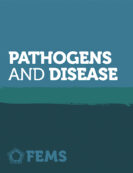FEMS Microbiology Letters Poster Prize: Astri Kusumawardhani
International Conference on Renewable Resources & Biorefineries
FEMS Microbiology Letters awarded a poster prize at the 15th edition of the International Conference on Renewable Resources & Biorefineries (RGB-15), which took place between 3rd and 5th June 2019 in Toulouse, France. Delegates from university, industry, governmental and non-governmental organizations and venture capital providers presented their views on industrial biotechnology, sustainable (green) chemistry and agricultural policy related to the use of renewable raw materials for non-food applications and energy supply. Congratulations to Astri Kusumawardhani who won this award. Read more about Astri’s research below.
Astri Kusumawardhani
What is your current position, and what was your scientific journey to get there?

Currently, I am a PhD student under the supervision of Prof. J. H. de Winde and Dr. Rohola Hosseini in Leiden University. My project is supported by LPDP grant from The Ministry of Finance, Indonesia.
I studied my bachelor (2009-2013) in pharmaceutical science and technology at School of Pharmacy, Institut Teknologi Bandung (ITB) in Indonesia. During my internship and final project, I became interested in the field of biotechnology.
This interest motivated me to continue on my master degree (2012-2014) in pharmaceutical biotechnology field at School of Pharmacy, ITB receiving scholarship grant for fast-track program from DIKTI Indonesia.”
Could you describe the research your poster covered?
Bacterial biocatalysis enables the usage of renewable feedstocks, thus generating a sustainable alternative for high-value chemicals production. However, biobased production of aromatic compounds and biopolymers requires a specialized cell factory.
Microbial hosts may experience toxicity caused by solvent-like compounds that function as products, substrates or intermediates in the production process. Therefore, solvent-tolerance is an essential trait for microbial hosts in the biobased production of aromatic chemicals and biopolymers. Pseudomonas putida S12 is inherently solvent-tolerant and is therefore a promising platform for biobased production of aromatic compounds and biopolymers.
The genome of P. putida S12 consists of a 5.8 Mbp chromosome and a 580 kbp megaplasmid pTTS12. The megaplasmid pTTS12 encodes several genes involved in stress tolerance, including the main solvent efflux pump SrpABC. Removal of pTTS12 and the subsequent loss of solvent efflux pump SrpABC caused a significant reduction in solvent tolerance.
In this study, we succeeded in restoring solvent tolerance in the plasmid-cured P. putida S12 using adaptive laboratory evolution to investigate the intrinsic solvent tolerance of P. putida S12. Whole genome sequencing identified several single nucleotide polymorphisms (SNPs) and a mobile element insertion which allow the solvent-adapted strains to grow in the presence of 10% v/v toluene.
Altogether, these mutations are responsible for the restoration of solvent-tolerance in the plasmid-cured P. putida S12.”
What do you hope to focus your research on in the future?
Solvent tolerant bacteria are important discoveries in biocatalysis and bioremediation fields. I am fascinated by the mechanisms that enable solvent tolerant bacteria to overcome the environmental stress caused by organic solvent.
Currently, I am focusing my work on identifying and characterizing genes/gene clusters which take part in solvent-tolerance. My final goal is to discover the interplay between these genes in orchestrating solvent-tolerance trait in bacteria.”
All but one of the FEMS journals are now fully open access (OA), with one journal, FEMS Microbiology Letters remaining a subscription journal with free-to-publish and OA options. Open access is key to supporting the FEMS mission of disseminating high quality research as widely as possible: when high quality, peer reviewed sound science is open access, anyone, anywhere in the world with an internet connection, can read it.







